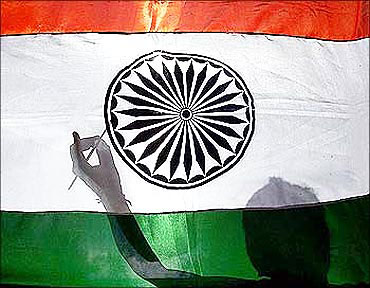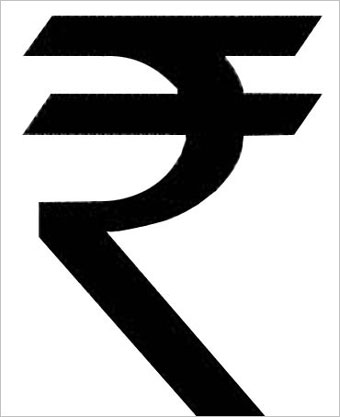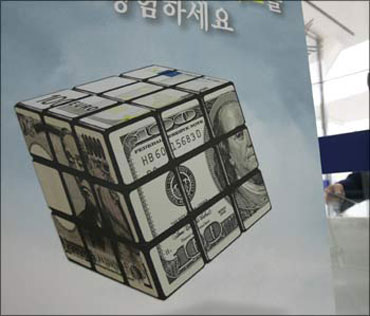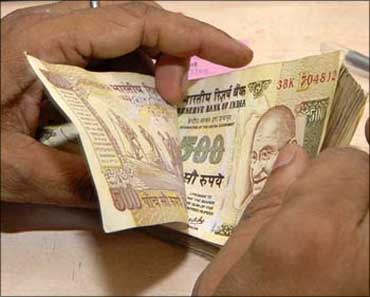 | « Back to article | Print this article |
Why India must dump 'crore' & move to 'million'
Now that the rupee has a symbol that is on its way to global recognition, the time has come for the government to take the next logical step: globalise the way money is counted in India.
This means moving away from the business of lakhs and crores, which is an indigenous legacy, and switching to the millions and billions that the world is familiar with.
This might seem a trivial issue to focus on when weightier matters cry out for attention; but weightier matters will always be there, and it would be wrong to dismiss a mass convenience factor so lightly, especially when the changeover can be accomplished quite easily.
In the globalised world, financial statements are usually prepared on standard software programmes which uniformly use millions and billions, with the commas falling metronomically after every three digits (rather than every two in the Indian system, once you are past the thousand mark).
Click NEXT to read on . . .
Why India must dump 'crore' & move to 'million'
Quite a few Indian companies have, therefore, switched to this format, but the majority sticks to lakhs and crores even though this usually involves making manual interventions to put the commas in different places -- a pointless expenditure of effort which also makes the numbers difficult to understand for all international audiences who follow Indian corporate and macro numbers.
Companies (and newspapers) have thus far been encouraged to use the legacy units for counting because the government presents its own financial numbers in lakhs and crores.
The pernicious result is that many Indians have begun to count even non-financial numbers in lakhs and crores, instead of millions (as with the country's population).
Forget being inscrutable to foreign audiences, most Indians too are prone to making mistakes when converting millions of dollars into crores of rupees, because a good part of even the literate population is not mathematically oriented and cannot figure out where to add or subtract zeroes.
Click NEXT to read on . . .
Why India must dump 'crore' & move to 'million'
Sub-editors on late-night newspaper copy desks will testify to the needless tension involved in getting the conversion right.
There is another convenience issue: the macro-economic numbers that people have to deal with now are large enough to cause oddities in the way the indigenous counting units handle them.
Thus, India's GDP this year is expected to be about Rs 68 lakh crore; if it grows by 50 per cent in the next four years, it will be more than Rs 1 crore crore!
How much more elegant to say that the figure this year is likely to be Rs 68 trillion, and four years later could be Rs 100 trillion. And, comparisons become demonstrably easier; for instance, American GDP is said to be Rs 650 trillion.
Click NEXT to read on . . .
Why India must dump 'crore' & move to 'million'
To be sure, traditional Indian mathematics is not to be under-estimated, because it has provisions for bigger units than a crore (like the arab and kharab, which are equal to a billion and 100 billion, respectively).
Indeed, the Indian counting system goes all the way up to an adant singhar, which is equal to one duodecillion -- a number that has 39 zeroes. But a system that has a new definition with the addition of every two zeroes, rather than every three, is inherently more cumbersome.
Also, words such as arab and kharab are not a part of everyday parlance, and will make Indian numbers even less comprehensible to the international audience, which might wonder why Indians are suddenly counting Arabs, and why they are kharaab!
So, Pranab Mukherjee, in the midst of admittedly greater challenges like introducing the goods and services tax and getting the direct taxes code adopted, might spare a thought for a simpler issue that can be dealt with quickly, and make counting a little more convenient for millions of people.
1 lakh = 100,000; 10 lakh = 1 million; 1 crore = 10 million; 100 crore = 1 billion; 1 lakh crore = 1 trillion.




